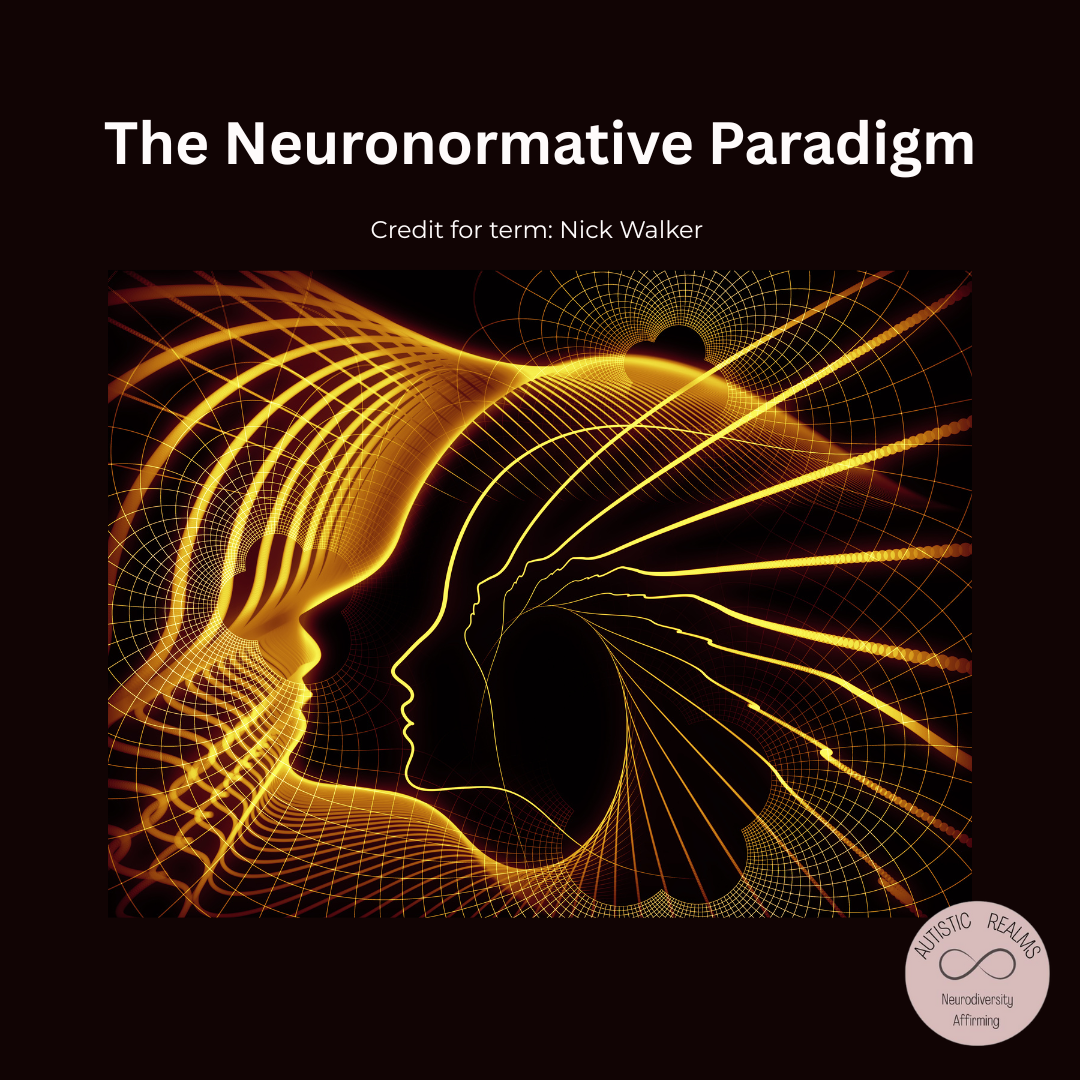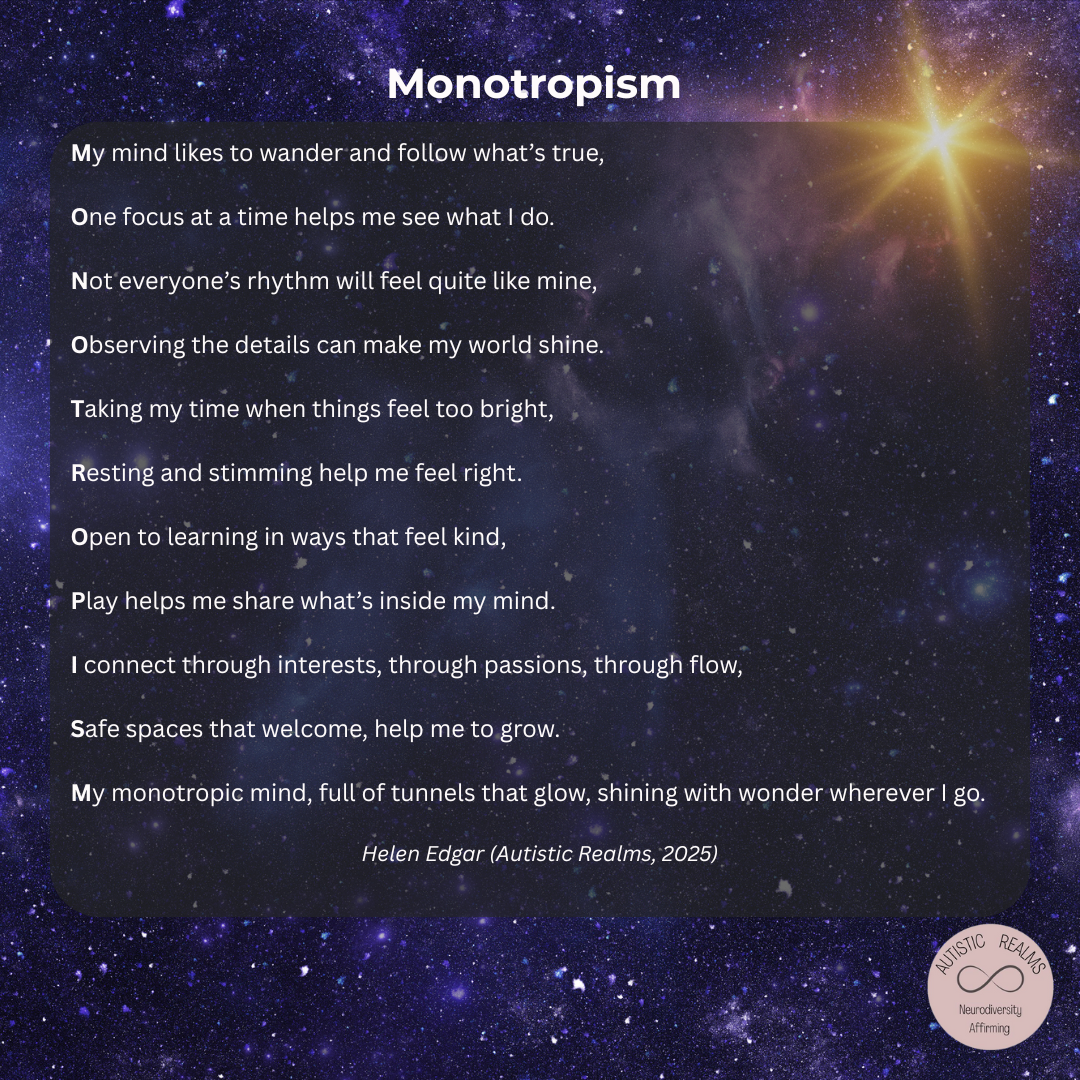Your basket is currently empty!

An unlearing and relearning journey.
Hello!
I have never done an introduction post for Autistic Realms, so after 18 months and some one kindly nominating me for the Positive Role Model Award as part of the National Diversity Awards and receiving so much lovely feedback, I thought I would share a bit about myself!
I am Helen Edgar, late identified autistic and I have two neurodivergent children. I didn’t know I was autistic until my 40s, so it has been an enormous unlearning and re-learning curve for me over the past few years.
I worked as an early years teacher in an SEN setting near Birmingham for almost 20 years, primarily working with those with profound and multiple learning disabilities and complex health care needs. I resigned due to my own children facing barriers to education and needing to be at home with them.
I thoroughly loved my job as a teacher and still miss it but feel hugely priveleged to have been able to be a small part of children’s lives and also learn from such an amazingly supportive multi-disciplinary team of other teachers, support staff, occupational therapists, speech and language therapists, physiotherapists, nurses and teachers for the visually and hearing impaired, to name just a few! This work provided me with the foundations for Autistic Realms and continues to inspire me. These experiences are now inevitabley woven into and transformed into the writing and the resources I am creating, My passion is reading about autism/monotropism/mental health/learning disabilities and discovering and reflecting on ways forward to provide a kinder, humanistic ecological approach to care and education.
I feel I learnt more from being with the children and their families than they likely learnt from me, although class was always busy with multi-sensory stories, messy creative play and dance massage fun! I learned the importance of listening and being there even when verbal words aren’t used, the value of connecting in shared spaces, and the potential of guiding learning by following and building on children’s personal interests to deepen their learning through play to provide more meaningful experiences.
My teacher training took place in the early 00s, which meant it was based on behaviourism, an approach I now reject. Through Autistic Realms I am passionately advocating to help families and professionals understand the value of understanding and embracing a trauma-informed, neurodiversity-affirming approach to support young people.
Discovering the neurodiversity-affirming theory of monotropism has been life-changing for me as an autstic person. I am deeply grateful for Dinah Murray and her colleagues’ first monotropism paper in 2005, which conceptualised this, and also the subsequent work from the research team that developed the monotropism questionnaire, which has helped explain and validate every aspect of my life.
I set up Autistic Realms 18 months ago at the end of 2022, with a passion for advocating for a better understanding of neurodivergence, mental health and learning disabilities. I am in the process of developing a more accessible and organised website, which will launch later this year, in the meantime you are welcome to explore the monotropic musings of over 50 blogs, 20 free downloadable e-books and around 500 infographics…..the collection grows almost daily!
More info about barriers to education and autistic burnout is here:
A big thank you to The Autistic Advocate, Autistic Parents UK, The PDA Space, Beacon NeuroConnect, Thriving Autistic, Viv Dawes Autistic Advocate, Pandas online, Joanna Grace Tsp, GROVE Neurodivergent Mentoring & Education, Fergus Murray Arts, Science & Minds, Nick Walker Sensei, Stimpunks, Emergent Divergence: The neurodivergent ramblings of David Gray-Hammond, Tigger Pritchard: Neuroaffirming Advocate, Consultant and Trainer and many others for being a huge part of this journey!
I hope some of my work is valuable – always onwards!
Helen xxx
Latest Posts
-
Autistic Burnout – Supporting Young People At Home & School

Autistic burnout in young people is real—and recovery starts with understanding. This post offers neuroaffirming ways to spot the signs, reduce demands, and truly support. 💛 #AutisticBurnout #Neuroaffirming #Monotropism #AutisticSupport
-
Monotropic Interests and Looping Thoughts

The theory of monotropism was developed by Murray, Lawson and Lesser in their article, Attention, monotropism and the diagnostic criteria for autism (2005). Monotropism is increasingly considered to be the underlying principle behind autism and is becoming more widely recognised, especially within autistic and neurodivergent communities. Fergus Murray, in their article Me and Monotropism:…
-
Map of Monotropic Experiences

Monotropism seeks to explain Autism in terms of attention distribution and interests. OSF Preprints | Development and Validation of a Novel Self-Report Measure of Monotropism in Autistic and Non-Autistic People: The Monotropism Questionnaire This map highlights 20 common aspects of my personal monotropic experiences. How many do you experience? Where are you on the map…
-
Autistic Burnout – Supporting Young People At Home & School

Being autistic is not an illness or a disorder in itself, but being autistic can have an impact on a person’s mental and physical health. This is due to the often unmet needs of living in a world that is generally designed for the well-being of people who are not autistic. In addition, three-quarters of…
-
The Double Empathy Problem is DEEP

“The growing cracks in the thin veneer of our “civilised” economic and social operating model are impossible to ignore”, Jorn Bettin (2021). The double empathy problem (Milton, 2012) creates a gap of disconnect experienced between people due to misunderstood shared lived experiences. It is “a breakdown in reciprocity and mutual understanding that can happen between people…
-
Top 5 Neurodivergent-Informed Strategies

Top 5 Neurodivergent-Informed Strategies By Helen Edgar, Autistic Realms, June 2024. 1. Be Kind Take time to listen and be with people in meaningful ways to help bridge the Double Empathy Problem (Milton, 2012). Be embodied and listen not only to people’s words but also to their bodies and sensory systems. Be responsive to people’s…
-
Autistic Community: Connections and Becoming

Everyone seeks connection in some way or another. Connections may look different for autistic people. In line with the motto from Anna Freud’s National Autism Trainer Programme (Acceptance, Belonging and Connection), creating a sense of acceptance and belonging is likely to be more meaningful for autistic people than putting pressure on them to try and…
-
Monotropism, Autism & OCD

This blog has been inspired by Dr Jeremy Shuman’s (PsyD) presentation, ‘Neurodiversity-Affirming OCD Care‘ (August 2023), available here. Exploring similarities and differences between Autistic and OCD monotropic flow states. Can attention tunnels freeze, and thoughts get stuck? Autism research is shifting; many people are moving away from the medical deficit model and seeing the value…
-
Monotropism Questionnaire & Inner Autistic/ADHD Experiences

Post first published 28th July 2023 Over the past few weeks, there has been a sudden surge of interest in the Monotropism Questionnaire (MQ), pre-print released in June 2023 in the research paper ‘Development and Validation of a Novel Self-Report Measure of Monotropism in Autistic and Non-Autistic People: The Monotropism Questionnaire.‘ by Garau, V., Murray,…
-
Penguin Pebbling: An Autistic Love Language

Penguin Pebbling is a neurodivergent way of showing you care, like sharing a meme or twig or pretty stone to say “I’m thinking of you,” inspired by penguins who gift pebbles to those they care about.
-
The Neuronormative Paradigm: Naming The Systems That Harm

The Neuronormative Paradigm, conceptualised by Nick Walker, names the systems that define and enforce what society considers normal. This exploration piece contrasts the neuronormative paradigm with the neurodiversity paradigm, which recognises all ways of being as vital to human diversity.
-
Monotropism: A Poem

A poem about monotropism for children, young people, families and educators to open conversations about Autistic & ADHD experiences.
-
Understanding the Double Empathy Problem: A Guide For Autistic People & Families

FREE Neuro-Affirming Communication & Sensory Passport + Training Support Autistic people through better understanding of communication, sensory needs & double empathy.













